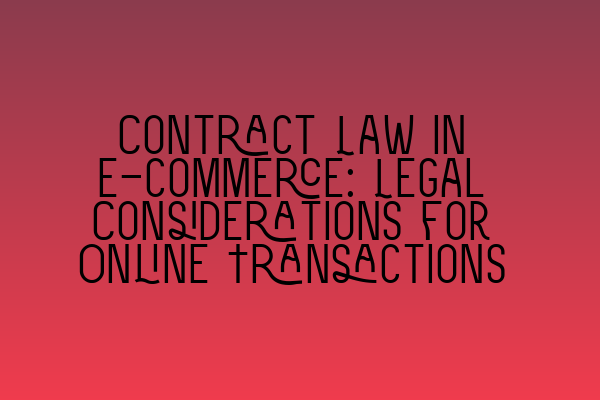Contract Law in E-commerce: Legal Considerations for Online Transactions
As the world becomes increasingly digital, e-commerce has become a popular means of conducting business transactions. With just a few clicks, consumers can purchase goods and services from the comfort of their own homes. However, with this convenience comes a multitude of legal considerations that both buyers and sellers need to be aware of. This blog post will explore the fundamental aspects of contract law in e-commerce and provide valuable insights into the legal considerations for online transactions.
1. Offer and Acceptance
At the heart of any contract is the concept of offer and acceptance. In e-commerce, this principle remains the same. The buyer, through browsing a website or adding items to a virtual shopping cart, makes an offer to purchase goods or services. It is important for the seller to clearly communicate the terms and conditions of the offer to ensure there is a mutual understanding between the parties.
Once the buyer submits their order, the seller must formally accept the offer. This could be in the form of an automated confirmation email or a notification on the website. It is essential that both parties are clear on when a contract is formed and what constitutes acceptance.
2. Terms and Conditions
When conducting business online, it is crucial for sellers to have comprehensive and well-drafted terms and conditions. These terms should outline important aspects of the transaction, such as payment terms, delivery arrangements, and refund policies. By having clear and transparent terms and conditions, sellers can protect their interests and minimize the risk of disputes with buyers.
It is important for buyers to carefully review the terms and conditions before making a purchase. By doing so, they can fully understand their rights and responsibilities, as well as any potential limitations or exclusions set by the seller.
Related Article: Legal Challenges and Pitfalls: Navigating the Complexities of the Legal System
3. Consumer Protection Laws
Consumer protection laws play a vital role in ensuring a fair and equitable marketplace. In many jurisdictions, there are specific laws and regulations that protect consumers in online transactions. These laws may cover areas such as the right to cancel a purchase, protection against fraudulent sellers, and remedies for defective or substandard products.
It is essential for sellers to familiarize themselves with the consumer protection laws in their jurisdiction to ensure compliance. Failure to do so can result in legal consequences and damage to the seller’s reputation.
Buyers should also be aware of their rights and take appropriate steps to protect themselves when engaging in online transactions. This may involve conducting research on the seller, reading reviews, and understanding the dispute resolution mechanisms available.
4. Security and Privacy
Security and privacy concerns are also significant factors to consider in e-commerce transactions. Sellers must take appropriate measures to protect the personal and financial information of their customers. This includes implementing secure payment gateways, utilizing encryption technologies, and having robust data protection policies in place.
Buyers, on the other hand, should be cautious when providing personal information online. They should look for secure websites with SSL certificates and only provide information to trusted and reputable sellers.
Related Article: Success on a Silver Platter: Achieving Work-Life Balance in the Legal Field
5. Dispute Resolution
Despite best efforts and precautions, disputes can still arise in e-commerce transactions. In such cases, it is important for both parties to have a clear understanding of how disputes will be resolved.
Many e-commerce platforms have their own dispute resolution mechanisms, such as customer support teams or online mediation services. Sellers and buyers should familiarize themselves with these procedures and be prepared to utilize them if necessary.
In some instances, formal legal action may be required to resolve a dispute. This is where the services of a solicitor become invaluable. A solicitor can provide guidance and representation throughout the dispute resolution process, ensuring that the rights and interests of their clients are protected.
Related Article: Mastering the Solicitor’s Path: Prepare for the Journey Ahead
In conclusion, conducting online transactions in the realm of e-commerce requires a solid understanding of contract law and the legal considerations involved. Sellers must ensure their terms and conditions are well-drafted, comply with consumer protection laws, and prioritize privacy and security. Buyers, on the other hand, should be vigilant in reviewing terms and conditions, protecting their personal information, and understanding dispute resolution procedures. By being aware of these legal considerations, both buyers and sellers can navigate the e-commerce landscape more effectively and avoid unnecessary conflicts.
Related Articles:
- Mentorship for Aspiring Solicitors: Nurturing Talent in the Legal Field
- Legal Challenges and Pitfalls: Navigating the Complexities of the Legal System
- Mastering the Solicitor’s Path: Prepare for the Journey Ahead
- The Benefits of Becoming a Solicitor: A Rewarding Career
- Success on a Silver Platter: Achieving Work-Life Balance in the Legal Field
